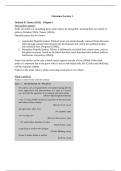Literature Lecture 1
Jackson & Tansey (2015) - Chapter 1
Does politics matter?
Some see politics as something good, while others are anti-politic, meaning they are critical of
politics (Weldon (1953), Tansey (2010)).
Depoliticization has two forms:
1. Unintended Depoliticization: Political issues are unintentionally removed from discourse,
often through external interventions like development aid, which turn political matters
into technical ones (Ferguson (1990)).
2. Normative Depoliticization: Politics is deliberately excluded from certain areas, such as
the global economy, based on the belief that these areas function better without political
interference (Jayasuriya (2002)).
Some view politics as the only suitable option against anarchy (Crick (2000)). Other think
politics is important due to the grave effect it has on individual daily life (Castles and McKinlay,
(1979); Schmidt, (1989)).
Politics in the wider sense is about exercising social power over others.
What is politics?
Politics comes from ancient Greece.
, There is a growing concern in Western democracies about a "democratic deficit/political
alienation/civic disillusionment," where citizens are increasingly disengaged from traditional
political activities like voting (Stoker, 2006). This shift may reflect a change in political
engagement rather than a decline in politics; they rather take individual actions. Lax and Phillips
(2012) found that in only half of 39 state-level policies was public opinion aligned with policy,
suggesting that political decisions often prioritize professionalization, ideology, and party policy
over public opinion. However, this isn't necessarily a major critique of democracy, as not all
decisions can reflect specific public opinions.
The concept of "politics" involves both conflict and consensus, as Maurice Duverger (1972)
suggested. Politics includes a wide range of situations where people cooperate to achieve shared
goals and compete when their objectives conflict. It involves argument, negotiation, and
sometimes coercion. As Crick (2000) notes, politics is not just about imposing power without
consent, nor is it about unanimous agreement. Unanimous agreement is also dangerous.
Approaches to the study of politics
The study of politics is both enriching and challenging due to the wide range of approaches by
scholars, but it can be frustrating as their conclusions cannot be easily unified, requiring students
to discern what is relevant and valid.
The three main contemporary academic approaches to studying politics are:
1. Traditional Scholarship: Focuses on in-depth, country-specific studies, often using
historical or philosophical methods, typical of the British approach (idiographic).
2. Social Science: Emphasizes deriving general theories about political behavior using
scientific methods, common in American political science (nomothetic/generalism).
3. Radical Criticism: Challenges the conservative bias of traditional approaches, often
advocating for radical societal change, influenced by Marxism, ecology, theology, or
feminism.
These approaches differ in their goals, methods, and underlying values, leading to distinct
perspectives that often don't overlap. In the present state of knowledge, it will often be found
that a combination of insights derived from different approaches often throws the most light on
an issue.





